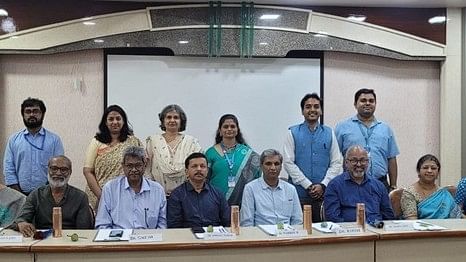
Experts at the Harnessing the power of marine venom: Research and outreach workshop.
Credit: X/@PIBMumbai
Mumbai: The Goa-based CSIR-National Institute of Oceanography (CSIR-NIO) in collaboration with Hindi Vidya Prachar Samiti's Ramniranjan Jhunjhunwala College at Ghatkopar in Mumbai held a comprehensive workshop exploring the possible therapeutic applications of marine venom.
The workshop titled Harnessing the power of marine venom: Research and outreach was attended by experts from across the country. It marked a significant advancement in both scientific research and public safety, according to a press statement.
The workshop focused on identifying venomous marine organisms and developing strategies to manage their venom risks while promoting conservation. This effort helps safeguard marine biodiversity and coastal communities, underscoring the growing importance of marine venom research.
With its potential for breakthroughs in drug discovery, biotechnology, and environmental conservation, marine venom, which is found in creatures like jellyfish, sea anemones, and cone snails, offers a rich source of bioactive compounds for therapeutic applications.
Coordinated by Dr. Narsinh L. Thakur, Senior Principal Scientist & Head of Chemical Oceanography Division at CSIR-NIO, the event was part of the outreach activities of the CSIR-funded Niche Creating Project on Biodiversity & Chemodiversity of venomous marine organisms.
Dr. Usha Mukundan, the Director of Ramniranjan Jhunjhunwala College, talked about the significance of collaborative research in addressing societal challenges.
Dr. Himanshu Dawda, Principal of RJ College, extended a warm welcome to all participants and dignitaries. The opening address was given by Dr. Mandar Nanajkar, Principal Scientist & Head PME at CSIR-NIO, while Dr Thakur provided an overview of the workshop.
The event was also graced by Sanika Gupte, Convener of the workshop & Head of Zoology Department and Dr. Geeta Joshi, Organizing Secretary.
The workshop attracted a diverse group of 150 academicians, scientists, research scholars, and postgraduate students from across Mumbai. Participants engaged in a series of insightful sessions led by experts.
Dr Thakur presented a comprehensive lecture on the biodiversity and chemodiversity of venomous marine organisms. An interactive session on the "Identification of Marine Venomous Organisms" was led by Dr. Mandar Nanajkar and Dr. Kalyan De, scientists from CSIR-NIO, Goa.
Additional notable sessions included talks on the venomous marine organisms of the Mumbai coast by Pradip Patade, Co-founder of Marine Life of Mumbai, and on the functional characterization of ion channel toxins from marine ribbon worms by Prof. Jan Tytgat, Head of the Laboratory for Toxicology and Pharmacology at KU Leuven, Belgium, who joined remotely.
An interactive session with the CSIR-NIO team, led by Mr. Venkat Krishnamurthy, Principal Technical Officer, and anchored by Dr. Geeta Joshi, provided participants with the opportunity to explore educational and research opportunities at CSIR-NIO.